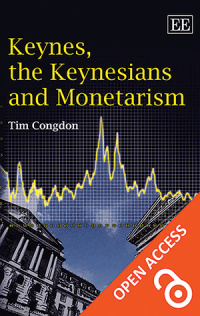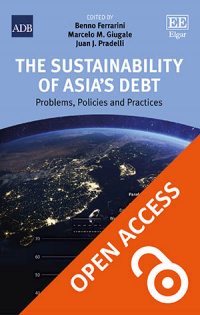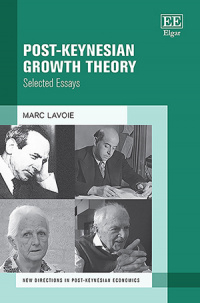Paperback
Keynes, the Keynesians and Monetarism
This is an open access title available under the terms of a CC BY-NC-ND 4.0 License. It is free to read, download and share on Elgaronline.com.
凯恩斯(Keynes),凯恩斯主义者(Keynesians)和货币主义是对宏观经济政策制定的持续辩论的重大贡献。蒂姆·康登(Tim Congdon)一直是货币主义经济原则的坚定支持者,已有30多年的历史了。他的著作 - 在报纸和议会委员会以及学术期刊中 - 在1980年代和1990年代在英国宏观经济政策的转型中发挥了影响力。
凯恩斯(Keynes),凯恩斯主义者(Keynesians)和货币主义是对宏观经济政策制定的持续辩论的重大贡献。蒂姆·康登(Tim Congdon)一直是货币主义经济原则的坚定支持者,已有30多年的历史了。他的著作 - 在报纸和议会委员会以及学术期刊中 - 在1980年代和1990年代在英国宏观经济政策的转型中发挥了影响力。
更多信息
Critical Acclaim
Contents
更多信息
凯恩斯(Keynes),凯恩斯主义者(Keynesians)和货币主义是对宏观经济政策制定的持续辩论的重大贡献。蒂姆·康登(Tim Congdon)一直是货币主义经济原则的坚定支持者,已有30多年的历史了。他的著作 - 在报纸和议会委员会以及学术期刊中 - 在1980年代和1990年代在英国宏观经济政策的转型中发挥了影响力。
这本书汇集了作者自1992年收藏《货币主义的思考》以来作者撰写的主要论文。It challenges several ‘conventional wisdoms’ about UK macroeconomic policy (and thinking about policy), arguing – for example – that the Keynesians’ advocacy of incomes policy and fiscal activism in the immediate post-war decades did not have a clear basis in Keynes’s own writings. The book denies that the UK had a ‘Keynesian revolution’, in the sense of a deliberately pursued fiscal activism to promote ‘full employment’. Implicit throughout the volume is a distinctive view of how the economy works, with an account of the transmission mechanism (from money to the economy) in which movements in asset prices and aggregate demand are strongly influenced by the quantity of money. Congdon uses this approach to demonstrate that monetary policy has had more powerful effects on macroeconomic activity in the post-war period than fiscal policy. He also suggests that the now fashionable ‘New Keynesian’ view of policy-making acknowledges the primacy of monetary policy and would be better termed ‘output gap monetarism’. In short, Keynes, the Keynesians and Monetarism contends that monetarism defeated Keynesianism in the battle of ideas in the 1970s and 1980s. The achievement of greater macroeconomic stability in the last 15 years is largely due to the impact of monetarist thinking on policy-making.
The book is clearly and attractively written, and covers topics that are fundamental to macroeconomic thinking and policy-making. It will be a provocative and appealing read for scholars at all levels of economics, macroeconomics and monetary theory. It will also find an audience among policymakers in central banks and finance ministries, business economists working in companies, and financial economists in the City of London and other centres.
这本书汇集了作者自1992年收藏《货币主义的思考》以来作者撰写的主要论文。It challenges several ‘conventional wisdoms’ about UK macroeconomic policy (and thinking about policy), arguing – for example – that the Keynesians’ advocacy of incomes policy and fiscal activism in the immediate post-war decades did not have a clear basis in Keynes’s own writings. The book denies that the UK had a ‘Keynesian revolution’, in the sense of a deliberately pursued fiscal activism to promote ‘full employment’. Implicit throughout the volume is a distinctive view of how the economy works, with an account of the transmission mechanism (from money to the economy) in which movements in asset prices and aggregate demand are strongly influenced by the quantity of money. Congdon uses this approach to demonstrate that monetary policy has had more powerful effects on macroeconomic activity in the post-war period than fiscal policy. He also suggests that the now fashionable ‘New Keynesian’ view of policy-making acknowledges the primacy of monetary policy and would be better termed ‘output gap monetarism’. In short, Keynes, the Keynesians and Monetarism contends that monetarism defeated Keynesianism in the battle of ideas in the 1970s and 1980s. The achievement of greater macroeconomic stability in the last 15 years is largely due to the impact of monetarist thinking on policy-making.
The book is clearly and attractively written, and covers topics that are fundamental to macroeconomic thinking and policy-making. It will be a provocative and appealing read for scholars at all levels of economics, macroeconomics and monetary theory. It will also find an audience among policymakers in central banks and finance ministries, business economists working in companies, and financial economists in the City of London and other centres.
Critical Acclaim
‘For anyone interested in the macroeconomic policy debates of the last fifty years, this is a very interesting book. It is well-written and draws on a wide range of sources which it treats with respect. One does not have to accept the argument to get a great deal of value from it.’
- 彼得·豪威尔斯(Peter Howells),经济问题
‘. . . there is a very useful and good-length introduction with a long appendix on the output gap. . . For anyone trying to understand the post-war British economy some understanding of these debates is essential. Certainly, economists and economic historians will want to read them but others too with an interest in British history and politics and current events will both benefit from and enjoy this collection.’
– Forrest Capie, Economic Affairs
‘Keynes, the Keynesians and Monetarism is an intriguing miscellaneous of essays by one of Britain’s leading monetarist economists in the 1980s and in the 1990s. The book indeed brings together the main academic papers written by the author revising and up-to-dating the previous collection titled, Reflections on Monetarism, with the new papers published in the first years of 2000. The book by this “advocate” of monetarism is very often appealing and provocative, covering topics that are fundamental to macroeconomic thinking and policy-making. . . certainly appealing for macroeconomists and researchers. . .’
——利诺分,经济的历史mic Ideas
‘In the context of the current economic climate, this volume provides an excellent opportunity for reappraising the arguments on both sides of the debate. . . The importance of this volume is that it provides the interested reader with an excellent summary of the monetarist position prior to the current crisis.’
– Economic Outlook and Business Review
‘Tim Congdon has been Britain’s leading monetarist for about three decades. . . He has a sharp eye for statistics, for history, for the twists and flows of intellectual fads, and for the political arena where debate hardens suddenly into the stone of decision. He is subtle, practical, bellicose and highly articulate. This volume is vintage Congdon in every sense.’
- 商业经济学家彼得·辛克莱(Peter Sinclair)
‘蒂姆·康登(Tim Congdon)的书重新审视了英国货币理论和政策的知识战场。他是货币主义的倡导者,他正在刺激,有争议和娱乐。’
- 英国伦敦经济与政治学院查尔斯·古德哈特(Charles Goodhart)
‘Whether rescuing Keynes from the “Keynesians” or finding support in his earlier works for a distinctly British version of Monetarism, Tim Congdon writes with engaging and provocative enthusiasm. This is a timely collection too, coming from a long-standing exponent of ideas that policy makers are once again beginning to take seriously. It deserves the careful attention of anyone interested in British monetary policy.’
- 加拿大西安大略大学的大卫·莱德勒(David Laidler)
‘As with all Tim Congdon’s writing, beautifully written and vigorously argued.’
- 罗伯特·西德斯基
- 彼得·豪威尔斯(Peter Howells),经济问题
‘. . . there is a very useful and good-length introduction with a long appendix on the output gap. . . For anyone trying to understand the post-war British economy some understanding of these debates is essential. Certainly, economists and economic historians will want to read them but others too with an interest in British history and politics and current events will both benefit from and enjoy this collection.’
– Forrest Capie, Economic Affairs
‘Keynes, the Keynesians and Monetarism is an intriguing miscellaneous of essays by one of Britain’s leading monetarist economists in the 1980s and in the 1990s. The book indeed brings together the main academic papers written by the author revising and up-to-dating the previous collection titled, Reflections on Monetarism, with the new papers published in the first years of 2000. The book by this “advocate” of monetarism is very often appealing and provocative, covering topics that are fundamental to macroeconomic thinking and policy-making. . . certainly appealing for macroeconomists and researchers. . .’
——利诺分,经济的历史mic Ideas
‘In the context of the current economic climate, this volume provides an excellent opportunity for reappraising the arguments on both sides of the debate. . . The importance of this volume is that it provides the interested reader with an excellent summary of the monetarist position prior to the current crisis.’
– Economic Outlook and Business Review
‘Tim Congdon has been Britain’s leading monetarist for about three decades. . . He has a sharp eye for statistics, for history, for the twists and flows of intellectual fads, and for the political arena where debate hardens suddenly into the stone of decision. He is subtle, practical, bellicose and highly articulate. This volume is vintage Congdon in every sense.’
- 商业经济学家彼得·辛克莱(Peter Sinclair)
‘蒂姆·康登(Tim Congdon)的书重新审视了英国货币理论和政策的知识战场。他是货币主义的倡导者,他正在刺激,有争议和娱乐。’
- 英国伦敦经济与政治学院查尔斯·古德哈特(Charles Goodhart)
‘Whether rescuing Keynes from the “Keynesians” or finding support in his earlier works for a distinctly British version of Monetarism, Tim Congdon writes with engaging and provocative enthusiasm. This is a timely collection too, coming from a long-standing exponent of ideas that policy makers are once again beginning to take seriously. It deserves the careful attention of anyone interested in British monetary policy.’
- 加拿大西安大略大学的大卫·莱德勒(David Laidler)
‘As with all Tim Congdon’s writing, beautifully written and vigorously argued.’
- 罗伯特·西德斯基
Contents
Contents:
Preface
简介:辩论是什么?
第一部分:凯恩斯和凯恩斯主义者
1。Were the Keynesians Loyal Followers of Keynes?
2.凯恩斯最好的书是什么?
3.凯恩斯,凯恩斯主义者和汇率
PART II: THE SO-CALLED ‘KEYNESIAN REVOLUTION’
4.英国有“凯恩斯主义革命”吗?
5.“凯恩斯主义革命”还剩什么吗?
第三部分:定义未来TISH MONETARISM
6. The Political Economy of Monetarism
7. British and American Monetarism Compared
PART IV: THE DEBATE ON THE 1981 BUDGET
8.预算赤字是否“人群”私人投资?
9. Did the 1981 Budget Refute Naïve Keynesianism?
10. 25年后,斯蒂芬·尼克尔教授之间的交流
和蒂姆·康登(Tim Congdon)
PART V: DID MONETARISM SUCCEED?
11.评估保守党的记录
12. Criticizing the Critics of Monetarism
13.自1992年以来,宏观经济稳定是否是由于凯恩斯主义,货币主义还是什么?
第六部分:经济如何运作
14.金钱,资产价格和经济活动
15.传输机制的某些方面
指数
Preface
简介:辩论是什么?
第一部分:凯恩斯和凯恩斯主义者
1。Were the Keynesians Loyal Followers of Keynes?
2.凯恩斯最好的书是什么?
3.凯恩斯,凯恩斯主义者和汇率
PART II: THE SO-CALLED ‘KEYNESIAN REVOLUTION’
4.英国有“凯恩斯主义革命”吗?
5.“凯恩斯主义革命”还剩什么吗?
第三部分:定义未来TISH MONETARISM
6. The Political Economy of Monetarism
7. British and American Monetarism Compared
PART IV: THE DEBATE ON THE 1981 BUDGET
8.预算赤字是否“人群”私人投资?
9. Did the 1981 Budget Refute Naïve Keynesianism?
10. 25年后,斯蒂芬·尼克尔教授之间的交流
和蒂姆·康登(Tim Congdon)
PART V: DID MONETARISM SUCCEED?
11.评估保守党的记录
12. Criticizing the Critics of Monetarism
13.自1992年以来,宏观经济稳定是否是由于凯恩斯主义,货币主义还是什么?
第六部分:经济如何运作
14.金钱,资产价格和经济活动
15.传输机制的某些方面
指数



